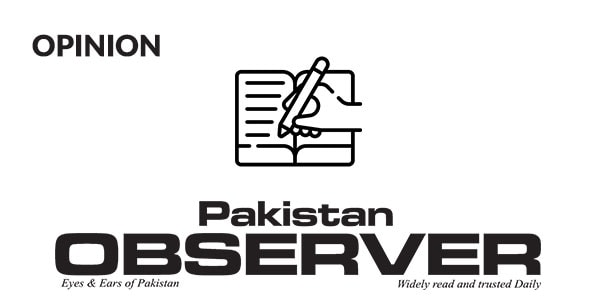Articles and letters may be edited for the purposes of clarity and space. They are published in good faith with a view to enlightening all the stakeholders. However, the contents of these writings may not necessarily match the views of the newspaper.
Violent & inconvenient agitations
Peaceful protest is a democratic right under the constitution. However, that right should not be abused to the extent that people are being inconvenienced in their everyday life and business is put to a stop almost on a daily basis.
This is the situation we see unravelling in Rawalpindi and Islamabad with PTI deciding to protest every day as part of their demonstrations to protest the mysterious murder attempt on party chief Imran Khan. Thousands of residents of Rawalpindi, including school-children, senior citizens, patients and vendors have been facing several hurdles in carrying on with their daily activities.
As a result of these protests, families, children and senior citizens remained stuck in traffic jams for hours on all three days. It is reported that even ambulances blaring sirens were not given the right of way to pass through. Showing its political strength to the government is necessary for any opposition party to negotiate. However, the PTI needs to enact wiser tactics and have a principled approach behind the protest. Protest is a right but blocking roads for the sake of it is a means to cause citizens problems, even though this has nothing to do with the political tussle.
If the PTI continues this way of protesting, not only is it provoking the government to react, it will weaken support as people are stopped from convening to their businesses, schools and hospitals. It is evident from the decreasing number of people in these protests.
These day-to-day protests have not achieved much in the past, and are usually called off on some pretext or the other, these demonstrations may have the same fate, and if so, the party will have achieved nothing but inconveniencing people going about their life. The best way to get demands fulfilled, the only recourse is purposeful negotiations not through “Ghairo & Jalao” and violent agitations.
MUNAWAR SIDDIQUI
Lahore
Longest school closures
UNICEF’s Global Director of Education revealed that the recent devastating floods had destroyed nearly 27,000 schools and rendered them inaccessible for more than two million children in flood-hit regions in Pakistan. According to him, millions of children are facing uncertainty and fearing prolonged discontinuation of their studies like they already endured some of the world’s longest school closures due to the pandemic in recent years.
UNICEF has quickly raised the issue of flood-affected schools in flooded regions which needs special attention from the concerned authorities. Unfortunately, the education sector had never been a priority for the successive governments in Pakistan. Thousands of schools that were destroyed by the deadly earthquake in 2005 had not been completely reconstructed and made operational by the relevant authorities over the past one and a half decades due to alleged corruption.
The government of Pakistan has the sovereign right to prioritize its needs and ongoing rehabilitation activities in the country. Hence, the concerned authorities must prefer the basic needs of the masses including health, education and water so a normal life in flood-hit areas can be started at the earliest.
MUNAWAR SIDDIQUI
Lahore
Plastic waste is a global crisis
Plastic waste is a global crisis – one that’s growing more serious every day. The packaging sector is responsible for almost half of the plastic in the world. Plastic packaging supports the safe distribution of food over long distances and minimizes food waste by keeping food fresher for longer and providing a barrier against bacteria. However, there is no best way to balance food, plastic waste and food safety.
The argument is that plastic is necessary to prevent food waste. But to tackle one crisis leads to another of food spoilage. Pakistan alone produced an estimated 3.9 million tonnes of plastic waste in 2020.
Roughly one-third, or 1.3 billion tonnes, of food packaging plastic, gets lost or wasted. Plastic leaks out of collecting and sorting systems and ends up in the soil and the ocean, degrading into fine Nano-sized particles that are harmful to animals and stay in food chains threatening our health.
A way to reduce plastic packaging is to create shorter food supply chains and ensure food does not go to waste. An alternative to plastic packaging can be food-grade silicone, reusable non-plastic wraps, wax papers, cloth wraps, fabric bowl covers, tiffinsz, bento boxes, etc. The authorities should ensure the availability of these non-plastic packing. Additionally, also encourage the major or minor food industries to resort to pollution-free packaging.
SAFIYA PISHORI
Karachi
Raising prices of petroleum
DAILY rising petrol prices are a big problem for the citizens. Petrol is being sold at Rs 225 per litre in all the cities recently. Diesel has also reached new heights in many cities Rs 247. It will have an impact on the economy of the citizens.
Petrol and diesel are required to move agricultural commodities from one place to another. The rise in petrol and diesel prices has also pushed up the prices of daily necessities and commodities. Some people manage their other expenses because of fuel.
We are also facing the lack of jobs, low rate of wages and household incomes. Even middle class people have to struggle a lot to fulfil their needs. People are under financial stress due to the increase in price of commodities and fuel. The government should consider the interest of the citizens.
HAREEM FATIMA
Lahore










